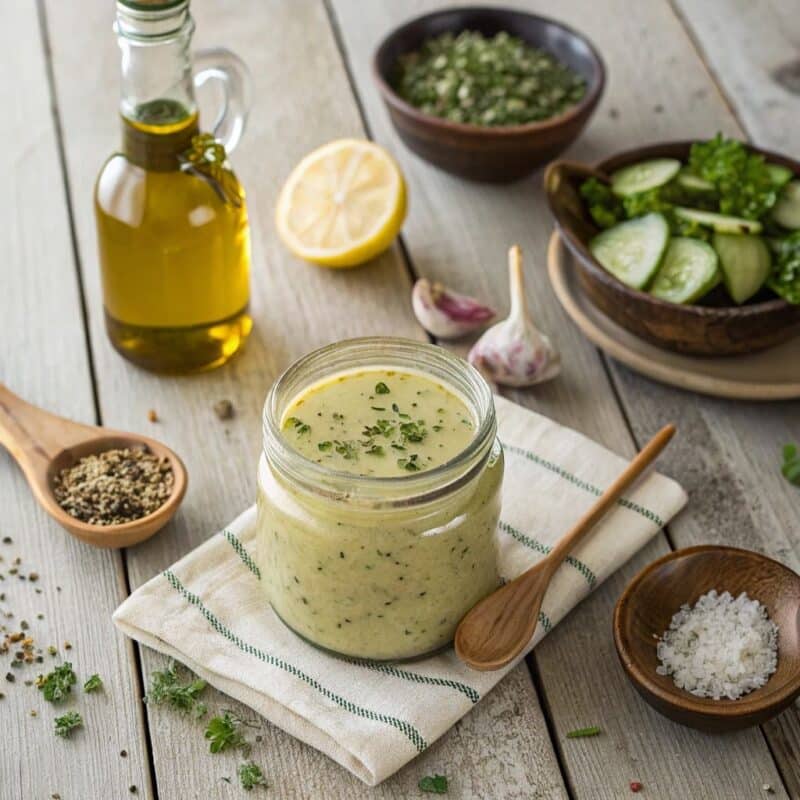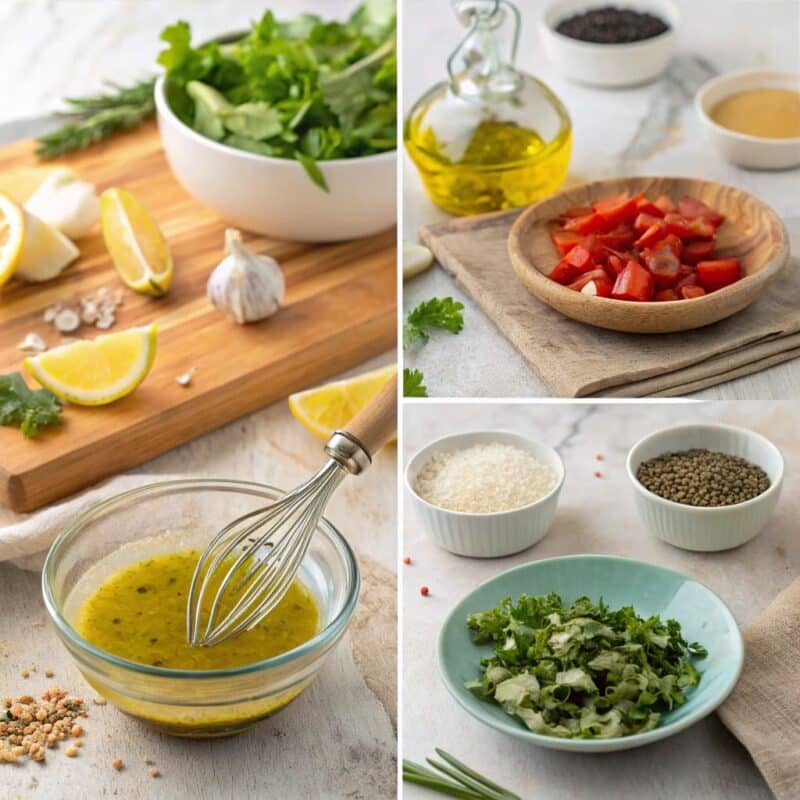
Mediterranean cuisine is celebrated around the world for its vibrant flavors and health benefits. Central to this diet is the use of fresh, high-quality ingredients that highlight the natural taste of food. Among its many culinary staples, Mediterranean dressing for salad stands out as a versatile and essential element.
Whether you’re drizzling it over a Mediterranean Cucumber Salad or pairing it with fresh vegetables, this dressing enhances not just flavor but also nutrition. Let’s dive into what makes it so exceptional.
What is the Healthiest Dressing to Put on Your Salad?
A salad can only be as healthy as the dressing you use. While many store-bought dressings are convenient, they often contain unhealthy fats, added sugars, and artificial preservatives. Enter Mediterranean dressing for salad, a natural and nutrient-packed alternative that ticks all the right boxes for health-conscious eaters.
The Role of Healthy Fats and Natural Ingredients
Mediterranean dressing shines because it uses extra virgin olive oil, one of the healthiest fats available. Unlike hydrogenated oils found in some dressings, olive oil is packed with monounsaturated fats that promote heart health and help lower bad cholesterol levels. Pair this with natural flavorings like lemon juice, garlic, and herbs, and you have a dressing that’s as wholesome as it is delicious.
Mediterranean Dressing vs. Other Dressings
How does Mediterranean dressing compare to popular choices like Ranch or Thousand Island? Ranch and similar creamy dressings often rely on mayonnaise or heavy cream, leading to high calorie and saturated fat content. In contrast, Mediterranean dressing is lighter, with no added sugars or artificial ingredients. It delivers pure flavor and health benefits with every drizzle.
Why Olive Oil and Vinegar Are Top Choices
At its core, a classic Mediterranean dressing combines olive oil and vinegar—a duo that not only tastes amazing but also offers significant health perks. Vinegar, such as balsamic or red wine vinegar, adds a tangy flavor while aiding digestion and stabilizing blood sugar levels. Together, olive oil and vinegar create a balanced dressing that enhances your salad without compromising your health goals.
What Are the 5 Most Popular Salad Dressings?
Salad dressings come in countless varieties, but only a few have earned worldwide recognition. Let’s take a look at the five most popular dressings and see how Mediterranean dressing for salad stacks up against the competition.
- Ranch Dressing: A creamy favorite in the U.S., Ranch is versatile but high in calories and preservatives.
- Caesar Dressing: Known for its rich, savory flavor, Caesar dressing often contains cheese and anchovies, making it heavier than other options.
- Italian Vinaigrette: A lighter choice, similar to Mediterranean dressing but often includes added sugars or oils.
- Balsamic Vinaigrette: Loved for its tangy sweetness, this dressing is a close cousin to Mediterranean dressing.
- Mediterranean Dressing: Simple, fresh, and healthy, this dressing stands out for its focus on whole ingredients like olive oil, vinegar, and herbs.
Mediterranean Dressing’s Unique Appeal
While Ranch and Caesar dominate in popularity, Mediterranean dressing offers a lighter, more natural alternative that’s free of heavy creams and artificial additives. Its combination of fresh herbs and high-quality olive oil makes it an ideal choice for those seeking a clean, nutrient-rich option.
Key Ingredients in Mediterranean Dressing
The beauty of Mediterranean dressing for salad lies in its simplicity. Each ingredient is thoughtfully chosen to create a harmonious balance of flavors and nutrition.
Olive Oil: The Heart of Mediterranean Cuisine
Extra virgin olive oil is the heart of Mediterranean dressing. It offers numerous health benefits, including supporting heart health and reducing inflammation. The dressing’s tangy touch from lemon juice or vinegar pairs beautifully with fish recipes like Mediterranean Salmon Recipe.
Vinegar or Lemon Juice: A Tangy Touch
Acidity plays a crucial role in Mediterranean dressing, and it typically comes from vinegar (balsamic, red wine, or apple cider) or freshly squeezed lemon juice. These ingredients brighten the dressing, adding a tangy kick that complements the richness of the olive oil. Plus, they offer additional health perks like improved digestion and detoxification.
Fresh Herbs and Spices
Mediterranean dressing gets its signature flavor from a blend of herbs and spices. Oregano, basil, and parsley are common choices, each bringing its own aromatic note to the mix. Garlic adds depth, while a pinch of salt enhances the natural flavors of the other ingredients.
Optional Additions for Variety
For those who like to experiment, Mediterranean dressing can be customized with a variety of additions. A touch of honey can add sweetness, while a dollop of mustard provides tang and creaminess. For a richer texture, Greek yogurt is a popular choice, creating a creamy Mediterranean dressing that pairs beautifully with hearty salads.
How to Make Classic Mediterranean Dressing at Home
There’s nothing quite like homemade Mediterranean dressing for salad. It’s fresher, more flavorful, and free from the preservatives often found in store-bought options. Best of all, it’s incredibly easy to prepare. With just a few pantry staples and fresh ingredients, you can whip up a dressing that will elevate any dish.
Step-by-Step Recipe

Here’s a simple yet authentic recipe for Mediterranean dressing that you can make in less than 10 minutes:
Ingredients:
- ½ cup extra virgin olive oil
- 3 tablespoons red wine vinegar or fresh lemon juice
- 1 teaspoon Dijon mustard (optional, for emulsification)
- 1 clove garlic, minced or grated
- 1 teaspoon dried oregano
- ½ teaspoon salt (adjust to taste)
- ¼ teaspoon freshly ground black pepper
- 1 teaspoon honey or maple syrup (optional, for sweetness)
Instructions:
- Combine the olive oil and red wine vinegar (or lemon juice) in a small bowl or jar.
- Add the minced garlic, oregano, salt, and black pepper.
- If using Dijon mustard or honey, whisk it into the mixture for added flavor and better consistency.
- Stir or shake the mixture vigorously to emulsify the oil and vinegar.
- Taste the dressing and adjust seasoning as needed. You can add more vinegar for tanginess or more honey for sweetness.
Pour your freshly made dressing over a salad or store it in the refrigerator for up to a week. Shake well before each use, as separation is natural.
Tips for Balancing Flavors
A perfect Mediterranean dressing strikes a balance between tangy, savory, and slightly sweet flavors. Here are some tips to fine-tune yours:
- Acidity: If the dressing tastes too oily, add an extra splash of vinegar or lemon juice to brighten the flavors.
- Sweetness: To balance acidity, incorporate a teaspoon of honey or maple syrup. For a sugar-free option, try a pinch of stevia.
- Saltiness: Taste-test your salad before adding extra salt to avoid over-seasoning.
- Garlic Intensity: Mellow out the sharpness of raw garlic by grating it finely or letting it sit in the olive oil for a few minutes before mixing.
Variations to Try
The versatility of Mediterranean dressing for salad means you can tweak the recipe to suit your preferences or complement specific dishes.
- Creamy Mediterranean Dressing: Add 2 tablespoons of Greek yogurt or tahini to the basic recipe for a thicker, richer texture. This version pairs beautifully with grain salads or as a dip for vegetables.
- Spicy Mediterranean Dressing: Add a pinch of red pepper flakes or a dash of harissa paste for a bold, spicy kick. It’s perfect for drizzling over roasted vegetables or grilled chicken.
- Herby Mediterranean Dressing: Double the fresh herbs like basil, parsley, or dill to create a vibrant, herb-forward flavor that works well with green salads.
Why Mediterranean Dressing is a Healthier Choice
Not all salad dressings are created equal, and Mediterranean dressing for salad is a standout for its nutritional profile.
Rich in Healthy Fats
The foundation of Mediterranean dressing is extra virgin olive oil, a source of monounsaturated fats that support heart health. Unlike dressings with trans fats or refined oils, olive oil helps lower bad cholesterol and improve good cholesterol levels.
Packed with Antioxidants
Olive oil, along with herbs like oregano and garlic, is rich in antioxidants. These compounds protect the body from oxidative stress, which is linked to chronic illnesses such as heart disease and cancer.
Low in Sugar and Artificial Additives
Many commercial dressings rely on added sugars, flavorings, and preservatives to enhance taste and extend shelf life. Mediterranean dressing, in contrast, is naturally sweetened (if at all) with honey or maple syrup and contains no unnecessary additives. It’s a cleaner, healthier choice for you and your family.
The Mediterranean Diet and Its Impact on Health
The Mediterranean diet is one of the most studied and celebrated eating patterns in the world, and Mediterranean dressing for salad fits seamlessly into its principles.
Overview of the Mediterranean Diet
This diet emphasizes whole, unprocessed foods like vegetables, fruits, whole grains, legumes, and healthy fats. Olive oil is a cornerstone, often replacing butter and other less healthy fats. Proteins like fish and poultry are prioritized over red meat, while herbs and spices replace excessive salt.
How Mediterranean Dressing Fits the Diet
Mediterranean dressing reflects the core values of the diet by using fresh, natural ingredients. It’s a quick and easy way to incorporate olive oil, herbs, and other healthful elements into your meals.
Long-Term Benefits for Heart and Brain Health
Studies have shown that following a Mediterranean diet can reduce the risk of heart disease, lower blood pressure, and improve brain function. The high antioxidant content in Mediterranean ingredients contributes to reduced inflammation and better overall health.
Serving Suggestions for Mediterranean Dressing
Mediterranean dressing for salad is incredibly versatile and can elevate a wide range of dishes.
Best Salads to Pair With Mediterranean Dressing
- Greek Salad: A classic combination of cucumbers, tomatoes, red onion, olives, and feta cheese that pairs perfectly with the tangy dressing.
- Couscous Salad: Add a drizzle of Mediterranean dressing to a couscous salad with roasted vegetables for a hearty, flavorful meal.
- Quinoa Salad: Combine quinoa with cherry tomatoes, arugula, and avocado, then toss with Mediterranean dressing for a protein-packed dish.
Using It Beyond Salads
- Drizzle over Roasted Vegetables: Add depth to dishes like roasted eggplant, zucchini, or bell peppers.
- Marinate Grilled Meats: Use the dressing as a marinade for chicken, lamb, or fish to infuse Mediterranean flavors.
- Dip for Bread: Serve the dressing as a dip for warm pita or crusty bread to start a meal on a flavorful note.
Store-Bought vs. Homemade Mediterranean Dressing
While store-bought dressings can be convenient, they often fall short in terms of flavor and nutrition compared to homemade options.
Comparing Nutrition and Flavor
Homemade Mediterranean dressing allows you to control the quality of ingredients. Store-bought versions may include lower-quality oils, added sugars, and preservatives. Making your own ensures a fresher taste and better nutritional value.
Tips for Choosing a Good Store-Bought Dressing
If you’re short on time and need a store-bought option, look for dressings that list extra virgin olive oil as the primary ingredient and avoid products with added sugars or artificial flavors. Check the label for low sodium content and minimal additives.
FAQs About Mediterranean Dressing
How long does homemade Mediterranean dressing last?
Homemade Mediterranean dressing for salad typically lasts up to 7–10 days when stored properly. Keep it in an airtight container or a glass jar in the refrigerator to maintain freshness. Before using, shake or stir the dressing as the oil and vinegar naturally separate over time. Avoid leaving it at room temperature for extended periods, especially if it contains fresh garlic, which can spoil faster.
Can you freeze Mediterranean dressing?
Yes, you can freeze Mediterranean dressing, but it’s not always ideal. While the ingredients remain safe to eat, the texture may change upon thawing. Olive oil tends to solidify in the freezer, creating a grainy consistency. If you must freeze it, store the dressing in a freezer-safe container and thaw it in the refrigerator. Whisk or blend it after thawing to restore its original texture as much as possible.
Is Mediterranean dressing keto-friendly?
Absolutely! Mediterranean dressing is a great choice for those following a keto diet. It’s low in carbs and high in healthy fats from olive oil. If you’re avoiding sugars, simply skip the honey or maple syrup in the recipe. Pair this dressing with low-carb salads, such as a Greek salad or a spinach and avocado mix, to keep your meal keto-compliant.
How can you make it dairy-free or vegan?
Mediterranean dressing is naturally dairy-free and can easily be made vegan. Omit ingredients like honey and substitute with maple syrup or agave for sweetness. Stick to plant-based ingredients, such as olive oil, lemon juice, and herbs, to create a vegan-friendly version that’s just as delicious. For creamy variations, you can use tahini or plant-based yogurt instead of traditional yogurt.
What are the best herbs for Mediterranean dressing?
The best herbs for Mediterranean dressing for salad include:
- Oregano: A classic choice for its earthy, slightly peppery flavor.
- Basil: Adds a sweet, aromatic note that pairs beautifully with olive oil.
- Parsley: Offers a fresh, grassy flavor that brightens the dressing.
- Thyme: Provides a subtle, woody undertone.
- Rosemary: Use sparingly for its bold, pine-like aroma.
These herbs can be used fresh or dried, depending on your preference. For the freshest flavor, chop the herbs finely and mix them just before serving.
Mediterranean dressing is more than just a flavorful topping for salads—it’s a celebration of the simplicity and healthfulness that defines Mediterranean cuisine. Made with wholesome ingredients like olive oil, vinegar, and fresh herbs, this dressing is a nutritional powerhouse that elevates any dish.
Beyond its health benefits, Mediterranean dressing for salad offers endless versatility. From classic Greek salads to roasted vegetables and grilled meats, its uses go far beyond the salad bowl. Plus, with countless variations and the ability to make it vegan or keto-friendly, it’s a dressing that suits nearly every diet and taste preference.
So, why settle for store-bought when you can create a fresh, homemade version tailored to your liking? Experiment with different ingredients, adjust the flavors, and make this dressing your own. Your salads—and your health—will thank you.

Mediterranean Dressing for Salad
Ingredients
For the Dressing:
- ½ cup extra virgin olive oil
- 3 tbsp red wine vinegar or fresh lemon juice
- 1 tsp Dijon mustard optional, for emulsification
- 1 clove garlic finely minced
- 1 tsp dried oregano
- ½ tsp salt adjust to taste
- ¼ tsp black pepper
- 1 tsp honey or maple syrup optional, for balance
Instructions
Mix the Ingredients:
- In a small bowl or glass jar, combine olive oil, red wine vinegar (or lemon juice), and Dijon mustard.
Add Seasonings:
- Stir in minced garlic, oregano, salt, and black pepper.
Whisk or Shake:
- Whisk the mixture thoroughly or shake it in a sealed jar until well combined and slightly thickened.
Taste & Adjust:
- Adjust acidity, sweetness, or salt as needed. Serve immediately or refrigerate for up to 7 days.
- Pro Tip: Shake before each use, as natural separation occurs.
Variations & Add-Ons
- Creamy Mediterranean Dressing: Add 2 tbsp Greek yogurt or tahini for a rich texture.
- Spicy Version: Mix in a pinch of red pepper flakes or harissa paste for heat.
- Herb-Infused: Increase fresh basil, parsley, or thyme for a stronger herbaceous flavor.
- Zesty Citrus: Substitute vinegar with freshly squeezed orange juice for a citrusy twist.
Storage Tips
- Store in an airtight container in the refrigerator for up to a week.
- Olive oil may solidify when chilled—let it sit at room temperature for a few minutes and whisk before use.
FAQs
- ❓ How can I make this dressing keto-friendly?
- Skip the honey for a completely low-carb version.
- ❓ Can I use fresh herbs instead of dried ones?
- Yes! Use 3x the amount of fresh herbs for the best flavor.
- ❓ What’s the best way to use this dressing?
- Drizzle over Greek salads, quinoa bowls, grilled chicken, or roasted veggies!
Final Thoughts
- This Mediterranean Salad Dressing is a simple, wholesome, and delicious way to enhance your meals. Whether used for salads, marinades, or dips, it brings bold flavors and health benefits to every dish.
- Try it today and bring the taste of the Mediterranean to your table!

1 thought on “Mediterranean Dressing for Salad”